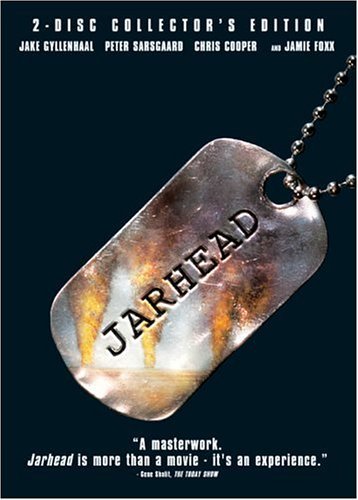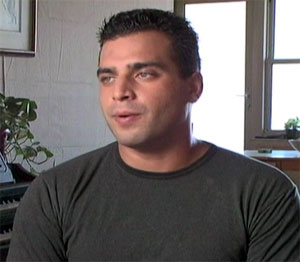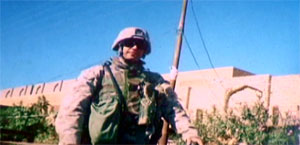 The 2-disc special edition DVD of Jarhead isn’t stuffed with the usual fluff that we’ve come to expect on quickly made, poorly thought out DVDs in recent years. The second disc has some truly excellent documentaries, including Semper Fi, a documentary made by Jarhead author Anthony Swofford that examines the lives of Marines who have returned home from Iraq – both Operations Desert Storm and Iraqi Freedom.
The 2-disc special edition DVD of Jarhead isn’t stuffed with the usual fluff that we’ve come to expect on quickly made, poorly thought out DVDs in recent years. The second disc has some truly excellent documentaries, including Semper Fi, a documentary made by Jarhead author Anthony Swofford that examines the lives of Marines who have returned home from Iraq – both Operations Desert Storm and Iraqi Freedom.
I had a chance to talk on the phone with two of the Marines featured in the doc, Angel Serrano and Michael Vlasaty, two guys who became good friends in Iraq and have brought that friendship home to New York. It turns out that Vlasaty is the talkative one – Serrano told me that he’s getting into sports medicine, and that was about it. Vlasaty, though, had a lot to say.
Some of what he had to say was very troubling. It seems that the emotional problems he’s had during his transition back to civilian life isn’t very uncommon. We talk about the dead and the wounded as the toll of the war in Iraq, but we don’t talk about the fact that every soldier who is sent there comes home changed. Physical carnage may not be the only grounds to object this war.
Also troubling, to me, was Vlasaty’s seemingly poor grasp of the general mission in Iraq. I’ll leave you to interpret his statements for yourself, but I wonder how many of the men and women over there right now think that they’re avenging 9/11, among other misconceptions.
The Jarhead DVD hits shelves tomorrow.
Q: When did you come back from Iraq?
Vlasaty: I landed back in the United States on April 13th. We went out on September 11, 2004 and landed back April 13th, give or take a couple of days.
Q: You were at Fallujah?
Vlasaty: Correct.
Q: Some of the guys in the documentary seemed to have a harder time coming home than others. At the time the documentary was shot, you seemed to be adjusting pretty well. How have you been since the documentary?
Vlasaty: You want honesty?
Q: I want complete honesty.
Vlasaty: Let me think how I want to make this sound right. I’m having a little more complicated time. I realized coming home from combat I’ve had to deal with my own demons in a way. All of the experiences I’ve come across and everything that’s happened, I feel like I’m trying to remove the painful memories that I have by self-medicating. Not even like drugs, it’s alcohol. It came to the point that I was drinking so much I became a danger to myself and other people. That was something I realized quick. After having a minor accident and breaking my ankle by being at the wrong place at the wrong time, I realized I have to take the necessary steps to move forward and stop messing myself up because alcohol is not helping me. I’ve started becoming more aggressive to my family and slowly but surely they’re turning their backs on me as well, which leaves me by myself. Which is fine, because no matter what I’m not going to be scared – I spent seven months in the worst place in the world where people were trying to kill me 24 hours a day, 7 days a week.
Long story short, there’s nothing I can’t handle but at the same time I’m using all the things I’ve learned and trying to prioritize them in my head and move forward.
Q: What really struck me about the documentary and the film is the idea that as a Marine you don’t handle a problem or situation alone – you have a group of guys who have your back at all times. Who has your back now? Who is helping you now that you’re home? Do you have fellow Marines, or is the VA helping? Vlasaty: To be honest with you there, my buddy Angel and me will always have each other no matter what. We do have the VA and currently I have a case worker that is in the VA who is helping me. People need to understand that therapy is a great tool in educating oneself. I don’t go to him because I need him to fix me, what I’m doing is using his brains to help me think and help me fix my own problems. I look at it this way too – look at the CEOs of all the big businesses. They sit in a board room with ten other guys who are frickin’ geniuses and of course, when you put ten minds together and you harness that energy and move forward, you can do anything you want.
Vlasaty: To be honest with you there, my buddy Angel and me will always have each other no matter what. We do have the VA and currently I have a case worker that is in the VA who is helping me. People need to understand that therapy is a great tool in educating oneself. I don’t go to him because I need him to fix me, what I’m doing is using his brains to help me think and help me fix my own problems. I look at it this way too – look at the CEOs of all the big businesses. They sit in a board room with ten other guys who are frickin’ geniuses and of course, when you put ten minds together and you harness that energy and move forward, you can do anything you want.
Q: I guess that’s the biggest lesson you learn in the Marines.
Vlasaty: Yes. You can do it yourself, but I think that’s a lot harder. I’m just trying to make it easier on myself.
Q: What did you think of the film Jarhead? Obviously your experience, where you went into combat, is different from what’s in the movie.
Vlasaty: But you know what – war, no matter where it is, whatever time frame, it’s horrible. It’s the most difficult thing I’ve ever had to deal with, especially over a long period of time. Don’t forget, I only did one tour – you’re talking about guys that we were with in Fallujah who were on their second tour and now they’ve gone back for their third. One tour really affected my life in a tremendous way.
Q: What’s your take on the anti-war protesters, the people who want to bring the troops home?
Vlasaty: I think they’re entitled to their opinion, but at the same time what people don’t realize is that, yeah we’re at war in Iraq, but we’re not just fighting Iraqis. We’re fighting Chechnyans, Syrians, we had a guy from Canada who was Muslim fighting in Iraq. For me it’s like, you have a problem with it? Why don’t you stop being part of the problem and be part of the solution and do something about it? You know what, I saw something wrong and I signed and I’m trying to make a difference. If you’re not willing to do the same thing – to pick up a weapon or vote or be involved in politics, don’t waste my time. Don’t talk to me and complain because I don’t want to hear you cry. I hear too many people cry. I’m supposed to help you? Help yourself.
Q: Writing Jarhead seems to have helped Anthony Swofford out a lot. Have you considered doing the same, writing about your experiences?
Vlasaty: I do every day. I sit down and do it every day. Me and Angel were thinking about collaborating on a book together, but I do it more for myself. These past few years I realized that I haven’t had a chance to sit down and have some me-time to organize my thoughts. I’ve had so much input, for lack of a better word, that now I have to organize – my feelings are off whack, my emotions. I have to sit back and deprogram everything I learned in the Marines and situate myself back to being a civilian, because I don’t have to be hard anymore. I don’t have to crazy. I don’t have to go into that gunfight where I might be killed. I can tone that down. I have all this pent up aggression and anger and knowledge – it’s so much experience wrapped up in one and it’s like an overload. I faced too much too quick.
The problem with combat is that you have instances to think about everything you want, to prioritize your life, where do I want to go from here, do I want to go to college, have a family, whatever the case may be. But then you have that instance when you walk into a house and you’re clearing a room and all of a sudden your whole squad is pinned down and every next move you make could be your last if you make the wrong decision. Or your buddy’s last moment.
Q: The Marines prepare you to go clear that room, to be efficient in combat. Do they prepare you to come home – is there as much emphasis on that as there is on soldiering?
Vlasaty: They try. I’m going to be very honest, they try to make that transition for you. But you know what? It’s too extreme. Think about this – picture the worst, most traumatic experience of your life, whatever that was. Let’s say that you got into a car accident or whatever. Now, us as Marines, when we plan a mission, we plan everything to go as completely wrong as possible – if this happens, or is this bomb goes off, or if we get attacked this way. You plan for the worst and the shit that just happened to you is a hundred times worse than the shit you planned for. That’s the shit that’s fucked up.
Q: And that’s the shit that haunts you.
Vlasaty: Yes. Even though you plan for the worst you never expect… here’s the other thing – not only do you have to anticipate a primary threat, getting shot or getting shot at by a sniper, but now we’re patrolling and we have to worry about an IED, which is a bomb in the road that we really can’t see because it’s disguised. Not only that do we have to worry about but now when we identify that bomb we have to back up so far, and they know we have to back up that far, so now we have to counter-insurgent the insurgent’s thinking. We have to analyze everything, inverted, exverted, inside out, black, yellow, every direction just to survive. It’s crazy.
back up that far, so now we have to counter-insurgent the insurgent’s thinking. We have to analyze everything, inverted, exverted, inside out, black, yellow, every direction just to survive. It’s crazy.
Q: After your experience in Iraq do you think that country is getting better, or do you think it’s getting worse?
Vlasaty: That’s something I really, my opinion isn’t relevant to my experiences in combat or in the military.
Q: It is relevant, because most of us here in America only know what we see on TV or read in the papers. You were there and you have a better sense of the situation, and that means when you’re seeing it on the news now or reading the paper now you have a better understanding than someone like me.
Vlasaty: So what is your question?
Q: My question is what is your unique perspective on the current situation in Iraq? Are things getting better or worse for the people there?
Vlasaty: I’m not going to answer your question the way you want me to, but I will tell you this. Something simple like voting – we set up a site giving out humanitarian aid, food, clothing, that’s the shit they don’t show you on the news. 60% of the Iraqi people voted for… for the… whatever… it wasn’t like a government, it was a council to elect whatever the next step is to elect people to lead some sort of structure. Do you see what I’m saying? 60% of the Iraqi people risked persecution, being martyrs, whatever the case may be, just to vote. Just a taste of Western civilization that we have and take for granted. The American public, in a presidential election or whatever, only 30% of the American public votes because nobody gives a fuck. Everybody’s happy, everybody’s eating. But that country where I saw with my own eyes people living – it’s like going back a hundred years or to Mexico but worse. You have insurgents torturing innocent people. So those people just want a little taste of what we have, but not everybody sees that big picture. People think we’re just going around the world being big bullies, but we’re not. We’re just taking a stand to protect ourselves.